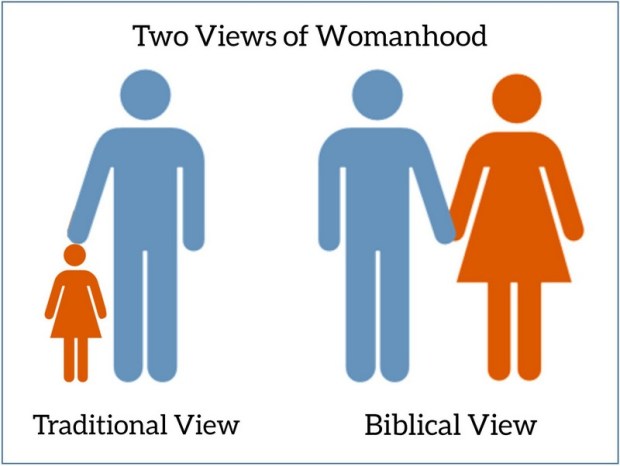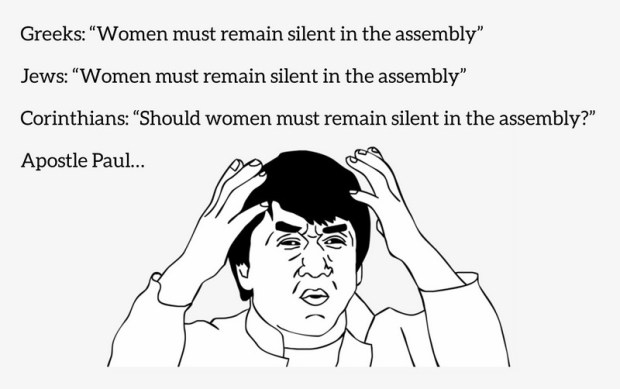Do you have a Biblical View of Women?

In the church, you will encounter two views about women. There is the traditional view (women should be meek, stay-at-home-mothers) and the so-called progressive view (women can do anything men can do).
Which view is Biblical?
I suspect most people would say the traditional view. Many churchgoers believe that the Bible calls women to be subservient and silent housewives.
Most people would be wrong.

What we call the traditional view comes not from scripture, but ancient Greece. It was the pagan philosophers of Athens who said the ideal wife was silent and subservient, and their views were exported around the world in a process known as Hellenization.
The alternative idea that women are equal with men and can do anything they put their mind to is the older idea. It was articulated by our Creator in Genesis 1 and modelled throughout the Bible.
What we call “traditional” should really be labelled a perversion of God’s original plan for partnership. As we will see, the traditional view is demeaning to women, harmful to families and thoroughly unscriptural.
What follows are four brief comparisons of the Greek and Biblical perspectives. Extended quotes and sources can be found in the 10-page study note “A Biblical View of Women” that accompanies this article (it’s free).
The Greeks: Women are meant to serve men
The Bible: Husbands and wives submit to each other
Socrates, Plato, and Aristotle all taught that women are inferior to men. And because they are inferior, women should be ruled by men. “The male is by nature superior and the female inferior; the male ruler and the female subject,” said Aristotle.
The Greek-speaking Jews of the first century felt the same way. Josephus the historian said, “A woman is inferior to her husband in all things. Let her therefore be obedient to him.”
However, the Bible teaches that women are in no way inferior. Both male and female were made in the image of God.
If you want to know what God thinks of women, look at how Jesus related to them. Jesus treated women with kindness and respect. He even trained them, which was something no Greek or Jewish teacher did.
Misguided men have been oppressing women from the beginning, but male privilege has no place in the new creation. “There is neither male nor female, for all are one in Christ Jesus” (Gal. 3:28).
The Greeks: A woman’s place is at home
The Bible: Men and women are to rule and reign and fill the earth
The philosophers and rabbis believed that only men could work, but this division of labor is not found in the Bible. God told the first man and woman they had been created to rule and reign together, and the Bible records many women who worked outside home.
Jesus encountered many women in his travels and not once did he send them home. He included women in his company of disciples, and he welcomed Mary when she left the kitchen to sit at his feet.
The Apostle Paul praised several women who he identified as colaborers in the gospel. Some of these, like Phoebe and Priscilla, travelled internationally. Others, like Junia, had such prominent ministries that they went to prison for preaching the gospel.
Raising children is a noble occupation, but the traditional view that a woman has no options besides being a homemaker is more pagan than biblical. In the Bible, both fathers and mothers are called to be active in the raising of children, and all of us are encouraged to fan into flame the gifts God has given us.
The Greeks: Women must be silent in the assemblies
The Bible: Men and women are encouraged to speak
The Greeks forbade women from speaking in public assemblies and the Hellenized Jews agreed. “It is a shame for a woman to let her voice be heard among men,” says the Talmud. Many today make the same error even though there are more than two dozen New Testament scriptures encouraging women NOT to be silent in church.
When the Jewish and Greek Christians of Corinth asked Paul whether women should be silent in church, he replied, “What? Are you out of your mind?” Paul rebuked the Corinthians for even contemplating such a thing and reminded them that “when you come together each of you can bring a hymn, a word, a tongue, an interpretation.”

The Greeks: Women cannot lead
The Bible: Anyone can lead if they are going in the right direction
In the pantheon of Greek philosophers, women are notably absent. Yet in the Bible we find many courageous women who led, and this was particularly true in the New Testament.
According to John Chrysostom, the women of the early church “were more spirited than lions, sharing with the Apostles their labors for the Gospel’s sake.”
The early Christians were well-acquainted with female prophets, female apostles, and female pastors. In the final chapter of his letter to the Romans, Paul named ten people involved in ministry in one form or another, and seven of them were women.
Jesus encouraged women to lead, and for a while they did. Then in the 364AD, the Council of Laodicea banned the appointment of women leaders. Jesus encouraged his disciples to let their light shine, but after the fourth century Christ’s female followers had their gifts hidden under a patriarchal bushel.
A biblical view of womanhood
The philosophers and rabbis are responsible for some of the worst ideas we’ve inherited about women. As a result of their sexist swill, many women have been kept silent and sidelined, and the world is poorer for it.
“There should be no division in the body,” said the Apostle Paul, and so say all who have been baptized into Christ. Indeed, is this not the test of our fellowship, that we esteem those the world deems weak and womanly, while giving greater honor to the parts that lack it?
We who have learned to see through the eyes of Christ no longer regard anyone from a fallen, or Greek, point of view.
—–
For sources and supporting material, check out Paul’s full-length study note “A Biblical View of Women.”
Paul’s new book The Silent Queen is now available on Audible and other audiobook outlets.



If women were encouraged to follow their heart in ministry, we could have twice the amount of people spreading the Gospel. (Emoji in deep thought here)
And the number of ministers experiencing burnout would halve.
Excellent article. There is a need for reformation and release from unbiblical traditions based on Greek ideas. I have found that Bible translation is also often bound by tradition. Thanks Paul.
Indeed it is, Arfon. You may be interested in an article and study note I have coming out next month entitled “How Sexist is your Bible?” Some translations are much more sexist than others in terms of introducing gender-specific language where there was none to begin with.
Seeing through the eyes of Christ is the key.
Seeing through God’s eyes of love is how you overcome false teachings about women.
I agree with your perspective on this subject. Men being promoted “over” women is a result of the fall and the curse of sin. The only verse I wrestle with on this subject is when it mentions the husband being the head as Christ is the head of the church. However, the Bible also says husbands are to lay down their lives for their wives as Christ laid down his life for the church.
I talk about biblical headship in The Silent Queen and will probably write some articles about it here in due course. Short version: it doesn’t mean he’s the boss.
Paul, I look forward to more of your articles on this topic! There are not enough anywhere else.
The way I see it our bodies are simply tents, outer shells from which a spirit operates. Physical features are nothing but tools with which the means of the spirit operates. No one gender is complete in itself. Why is the church considered a body when it consists of both make and female? Simply because a body is a tool with which God can operate through. We need each other equally as we equally need God.
” If you want to know what God thinks of women, look at how Jesus related to them. Jesus treated women with kindness and respect. He even trained them, which was something no Greek or Jewish teacher did.”
Given the fact that Jews also thought differently than Jesus, perhaps a more precise title would be “A New Covenant View of Women.” As Grace teachers, we know that not everything that is “kosher” under the Mosaic Covenant (but is “Blibical” because it is “in the BIble”) is compatible with the revised terms of New Covenant. Much confusion (and ire) comes from even “Biblical scholars” who don’t take note of the different terms in each of the Five main covenants in the Bible – especially between the works-based Mosaic Covenant and the Grace-based New Covenant – that is made between Father-God and Jesus on Calvary on our behalf. Just a thought! Thanks, saint Paul, for always trumpeting abounding Grace!
It’s Biblical in the sense that it reflects God’s heart from Genesis 1 onwards. God’s heart for partnership and equality shines throughout the Old Testament, even in the Ten Commandments. The Jewish view of subordinate women might more properly be labelled the patriarchal view or, as I have called it, the traditional view. Thanks for the comment, Leonard.
I agree with what you say, but I can’t ignore the Biblical arguments presented by people in my church who are opposed to women taking part in the formal assembly. For example, are we to discard Scriptures like I Corinthians 14:34-35, where Paul instructs women to be silent? There are other Scriptures where Paul indicates that women are to be subject to their husbands and not take authority over men.
Dismiss the arguments, but keep the scriptures. Paul never says women should remain silent in the assemblies. Rather, he encourages men and women to speak up, teach, prophesy, etc. on dozens of occasions. (Funny how those who want women to remain silent are silent about those scriptures!)
Yes, women are to submit to their husbands. That’s Ephesians 5:22. But read the preceding and succeeding verses and you will find husbands are supposed to submit to their wives. (More scriptures that are conveniently overlooked by the peddlars of Greek tradition!)
Did you know that on at least one occasion Paul refers to women as the heads or presidents of their households? (Yet another scripture that gets conveniently overlooked.)
Jesus and the Apostles clearly and consistently reinforce God’s original pattern for partnership. Only by dismissing dozens of scriptures and twisting a few out of shape can you come up with anything that looks remotely like hierarchy.
If you would like to dig deeper, I encourage you to check out the Archives > Scripture Index. I have written several articles (and a book) covering all the scriptures that are traditionally twisted to keep women silent and sidelined.
Paul, since the woman is the head of the house, do you submit to and obey your wife when you are at home? I don’t know of anyone who knows the truth about women like you do! You must be a Bible Guru.
I submit because I love her, and vice versa (see Eph 5:21-22), and because I belong to her and she belongs to me (see 1 Cor 7:4).
Ahh beautifully stated, Paul… thank you!
Fantastic article, Paul! When first saved, the church I attended was extremely patriarchal & said that unmarried women were under the headship of any man in the church! Thank you for the revelation you share here.
My pleasure, Karen.